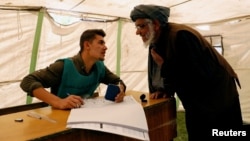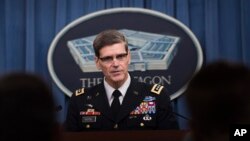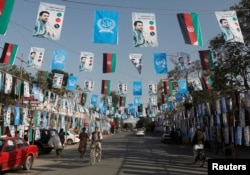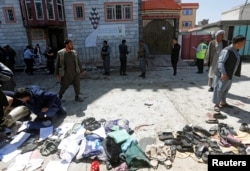As concerns mount over the security of Afghanistan’s upcoming parliamentary elections scheduled for Oct. 20, Afghan officials are downplaying the threats and saying that the country’s security forces are capable to securing thousands of polling stations across the country.
On Thursday, the Afghan government unveiled its security plan of deploying about 54,000 security forces to about 5,100 polling stations in the country on election day.
At a press conference in Kabul on Thursday, Nusrat Rahimi, a spokesperson for the Afghan ministry of interior, said all polling stations would be secured by security forces including defense, intelligence and air force personnel.
Tariq Shah Bahrami, Afghan minister of defense, Tuesday said that the Afghan army would conduct targeted military operations days before the election to pave the way for a safe and secure election.
“Before the election day, we will conduct operations in some areas that require to be cleared of the enemy so we could provide a secure environment for the election,” Bahrami said in a video statement released by the Afghan ministry of defense.
NATO help
Afghan security forces will also have the support of the U.S-led NATO forces.
Responding to a VOA question during a video briefing at the Pentagon Thursday, U.S. Army General, Joseph L. Votel, commander of U.S. Central Command, said coalition forces would help Afghan forces with both security and distribution of election materials.
“That has been an area of specific focus here for our coalition forces on the ground: To make sure that we are working with Afghans as much as we can to ensure that they can secure their people and they can secure these locations [polling stations],” Votel said.
Despite the assurances, some experts believe that security threats should not be underestimated.
Khalil Roman, a Kabul based analyst, told VOA that the potential threat posed by various militant groups active in Afghanistan could affect the turnout of the election.
“Security threats do potentially exist and if militants carry out attacks on the day of the election, fewer people will turn to the polling stations," he said.
Meanwhile officials of the Afghanistan’s Independent Election Commission (IEC) told VOA that voter turnout would not be affected because security forces are fully prepared and up to the task.
“We are in constant contact with our security institutions. They have increased their clearing operations by 26 percent to secure the restive areas so the enemy could not create any problem on election day,” Zabihullah Sadat, a spokesperson for IEC, told VOA.
Cautious optimism
Some analysts like Walter Dorn, an Afghanistan expert and professor at Royal Military College of Canada & Canadian Forces College, are cautiously optimistic that Afghan security forces can deliver adequate security.
“The Afghan security forces have already gained experience with elections, having provided security for five national elections in the century,” Dorn said. “But the challenges are great: threats of attacks, providing security for the polling stations and for the ballot boxes, as well a campaign rallies and the candidates.”
Militant attacks
Militant attacks against election workers, candidates and voters are not a new issue in Afghanistan.
During the 2014 presidential elections, the Taliban cut off the fingers of some voters in different parts of the country after they ignored the militant’s warnings and went to polling stations.
This year, militant groups carried out several attacks since the election campaign officially kicked off late last month, targeting candidates and their supporters.
Last week, Islamic State claimed responsibility for a suicide bombing that struck a campaign rally in eastern Nangarhar province, killing at least 14 people and wounding 43 others.
On April 22, (IS) claimed responsibility for a suicide attack on a voting registration center in Kabul, killing at least 60 people and wounding 130 others.
U.N. Assistance Mission in Afghanistan (UNAMA) expressed concerns over violence early in the campaign season in Afghanistan and urged all parties to the conflict to avoid violence and intimidation against candidates and voters.
“I am outraged by attacks deliberately targeting civilians seeking to exercise their basic right to participate in elections,” Tadamichi Yamamoto, the U.N. Secretary-General’s Special Representative for Afghanistan, said in statement Tuesday.
The Taliban have already warned voters in some remote areas of the country to boycott elections.
“They gathered us in the mosque and warned us that if we went to the registration centers and voted, they would burn down the village,” Kamal Uddin, a resident of Rahmat Abad village in northern Balkh province told Reuters in April.
Voters and security
About 8.8 million Afghans have registered to vote, but some say their decision to go to the polls depends on security in the days leading up to the election.
Naim Atarud, a civil activist who lives Kabul, told VOA he does have confidence in the ability of the Afghan security forces to provide security on the election day, but he fears that one incident can change everything.
“In case of an incident, this will discourage voters to be present at the voting centers as their lives and personal security matters to them the most,” Atarud said.
Tasneem Qarar, a resident of eastern Nangarhar province, however, told VOA that he will vote regardless of the security threat to fulfill what he said was his civic duty.
“Although I am not very confident about the transparency of the election, the presence of many young candidates in the election has driven me to vote, and I will vote no matter how bad the security situation is,” Qarar said.
Carla Bobb, VOA’s Pentagon correspondent contributed to this report.







